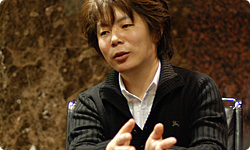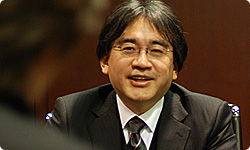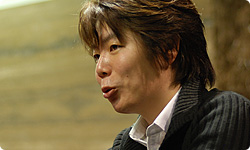3. The Contrast Between Fear and Release
To explore that a little further, when fans enter an organisation, they understand and love that company’s products excessively, so their attitudes veer away from those of other people. That is a challenge for many groups of software developers today. But I feel like that doesn’t happen much at Capcom. You are able to maintain the core appeal of the game without wavering from its essence.
Yes. We’ve been trying a number of different styles but we are aware of which ones we are good at and which ones we aren’t. We try to expand on those areas that we are good at.
A group that can say, “This is what we’re good at,” is appealing. I often hear these days that games out of Japan are finding less favour around the world than they used to, but Resident Evil has continued to find acceptance all over the world.
On the other hand, from our point of view, Nintendo’s games are so solid that we’re always looking for what we can learn from them.
There is all kinds of entertainment out there, but there’s a fine line between stability and being stuck in a rut. If you keep making the same thing, people will get sick of it. If you create something perfectly comfortable, they will say it’s the same old thing, but if you grow too adventurous, they will say it’s changed too much. This is a dilemma all developers face when making a game in a series.
That’s right.
Nintendo’s team that works on the Super Mario Bros. series14 gradually changes hands from one generation to the next. When team members representing various generations gather, they talk about the Iwata Asks: Super Mario Galaxy The same is true for the Legend of Zelda series.15 I’m certain Resident Evil has its own essence, and as generations change and more people become involved with it they have carried it on and added new elements to it. How would you express the essence of Resident Evil? 14Super Mario Bros. series: The first game in the series was released for the Family Computer (Famicom) system in September 1985 in Japan. 15The Legend of Zelda series: The first game was released for the Family Computer Disk System in February 1986 in Japan.
In a word, “fear.” But fear alone isn’t enough. I think one reason so many people have liked Resident Evil for so long is that we’ve been able to provide a high level of quality when it comes to game elements such as graphics and sound. I think Resident Evil: Revelations is a good opportunity for us to appeal to a wider audience since it is a completely new game outside the numbered series.

Earlier, you talked about contrast. The games display a stark contrast between fear and release. Unceasing fear wouldn’t be very fun. (laughs)
You wouldn’t want to keep playing.
It’s interesting how many women have said, “I don’t like this because it’s scary,” while they were still gripping the controller and playing the game. I wonder why that happens so much. I feel like that may be a clue to the secret of Resident Evil’s success.
Maybe women have a higher tolerance for horror. (laughs) Many movies and graphic novels are geared toward women. Resident Evil’s appeal, and the appeal of the horror genre in general, lies in a fear of the unknown. Part of the game’s fun is encountering opponents and fighting them, but the real thrill of a horror game is what leads up to that - that creepy atmosphere in which you think, “Something might lunge out of there...”
The scariest part is up until something attacks.
Yes. It looks like something will lunge out, but it doesn’t always. That uncertainty is addictive! (laughs)
Yeah, it’s simply scary. Scary, but you can’t stop. I suppose that has something to do with the pleasure you feel when released from fear.

Yeah. We pay attention to the ways players can release their fear, such as by blazing away with their gun. The contrast in that rhythm is important, too.
I wonder if what has sustained the series all these years is something the team has a better grasp of than other teams with regard to making horror games. I feel like it may be a tradition rooted in the team or an underlying strength of the people who have carried on and nurtured the Resident Evil essence. Having the viewpoint be from a fixed camera in a room arose because of the early restrictions placed by an unmoving background, and Resident Evil has built upon that as it evolved up to the present day. The games are now able to do much more, the contrast between fear and release has intensified, and they have grown quite dynamic.
I heard that the development staff’s ideal game was one in which all the stages were 3D, like in Resident Evil 4. Unfortunately, the hardware back then wouldn’t allow the ideal visuals, so the game ended up involving a fixed camera.
The style changed a lot with Resident Evil 4. The fans really loved it. A long-running franchise will go through major changes even if it sticks to its roots, and I think Resident Evil has done that well.
I wasn’t directly involved with developing Resident Evil 4 for the Nintendo GameCube system, but perhaps that was a good thing. Unlike the hands-on staff, I was able to watch from an objective standpoint. The director had firm ideas about it, the surrounding staff members responded to all the difficult demands, and the schedule was tight. I thought it was turning into quite an outstanding game, as if a miracle was happening.

From the outside, you have a better view of how things are going.
Right. The staff members were always asking me, “Is this fun to play?” They were always making adjustments, so they needed someone to look at it objectively and tell them if what they were making was actually fun or not.
Why do you think that miracle occurred?
I think one reason is that our engineers were incredibly accustomed to the Nintendo GameCube system. It was always easy hardware to develop for, but we were able to take a lot of know-how from Resident Evil and make good use of it. Also, the staff itself was developing well. Above all, however, director (Shinji) Mikami-san’s enthusiasm and natural talent for game-making was incredible, and that mixed well with the quality of the staff and the timing of development.
In order to make such a big change to the game, you would have to set aside the methods you had used so far. That must have been unsettling. But those who witnessed that miracle must have felt like their chances for seeing something like that through had increased, because it is incredibly important to believe the impossible can become possible. The sea change instigated by Resident Evil 4 was an important challenge that determined how strong the franchise would remain in the future.
Yes. The developers were determined to make a complete change. A strong idea of what you want to achieve is more important than anything else when developing a video game, and in making things in general.